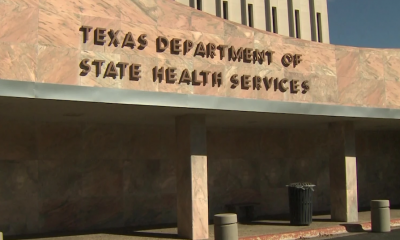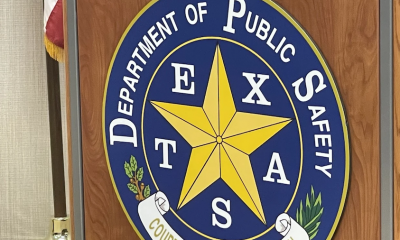U.S. News
For Plano, Questions Still Linger About the February Power Outages

PLANO, TX – It was the day after Valentine’s Day, and Michael Rendell thought his girlfriend might die. Katie Booker, Rendell’s partner of four years, lives in East Plano with her parents. When Winter Storm Uri arrived in Texas, the Bookers were in one of at least 50,000 homes that lost power in the area.
“They live in a pretty small, pretty old house, and they were literally freezing in there,” Rendell recalls. “Katie always gets on me for worrying too much, but in this case, I think my worries were pretty valid. It was maybe maybe 5 degrees in that place for a day and a half.”
The Bookers eventually regained power early Thursday of that week, but a month later, they still have more questions than answers.
“I guess my biggest question is, ‘why were we lied to?’” Katie says. “Why did we hear it was going to be a rolling blackout situation, then have to wait for hours and hours, literally in the dark?”
Much of the national media coverage has focused on the shortcomings of the Electric Reliability Corporation of Texas (ERCOT), the state’s previously obscure electric grid operator. While ERCOT executives have mostly tried to shirk responsibility, some cities in North Texas disagree.
For instance, the city of Denton was reportedly forced to spend $207 million for ERCOT electricity during the mid-February storms, and is now suing the grid operator to avoid paying that bill. The city already took out an emergency loan to pay part of their pricey tab, but its attorney’s argue that ERCOT is illegally passing the cost of electricity on to cities. As of this writing, ERCOT is legally banned from demanding payments from Denton, and cities in Collin County are not facing the shocking invoices that have enraged leaders in Denton. However, staffers in cities like Plano and McKinney still have plenty of questions about the power outages that transpired last month.
“By the middle of that week, residents were asking us, ‘Should we leave? Should we go to a hotel, or go see family?’” recalls Brandi Youngkin, Plano’s director of policy and government relations. “And, honestly, we didn’t have a good answer for them, because we didn’t know a whole lot ourselves. That’s the one thing we know has to get better: communication.”
First, it’s important to note a key difference between Plano and cities like Denton and Garland, both of which are members of ERCOT. Denton denizens get their power from Denton Municipal Electric, a city-owned utility. Plano has no city-owned utility, and much of the city’s residents get their power from either Oncor or CoServ Electric. So when Youngkin heard storms were on the way, she checked the latest communications from CoServ.
“I remember that Saturday morning they were telling us to expect ‘rolling blackouts,’” she says. “Sunday morning, it was the same message.”
Yet by nature, she says rolling blackouts should last somewhere between 15 and 45 minutes, not hours or days. In Youngkin’s view, it’s important to “set realistic expectations” and be overprepared. However, she doesn’t fault her contact at Oncor for the lack of preparedness.
“He didn’t know what was happening,” she says. “It was above his level.”
By now, everyone knows what happened: the storms cost Collin County residents their power and heat, leaving people like the Bookers to bundle up under small mountains and blankets and wonder which would come first: a break from the frigid temps or the return of their lights. Staffers scrambled. Youngkin says deputy city manager Greg Rushin was just one of many city employees who tried to figure out what was going on for the city residents while coping with power outages and burst pipes in their own homes. Employees from the library and parks and rec department stepped in to field the high volume of calls from concerned citizens, but no one could definitely say how long the power outages would last. After all, the city was told “15 to 45 minutes.”
“Usually Oncor has an outage map,” Youngkin says, “and we can monitor that and have an expected date of when things are going to be fixed. This time, that didn’t work.”
For some people in Plano, salvation came from a familiar source: church. The city teamed with Grace Church Plano to open an emergency warning center for residents without power. However, without Internet service, some people had no idea.
“This is the first I’ve heard of that,” says Michael Hyatt, another East Plano resident who lost power during the storms. “When I was in the middle of all that, I felt alone, you know? And that’s not a good feeling.”
Soon after the last of the snow melted and most of the lights were back on, Youngkin and other staffers started trying to figure how “rolling blackouts” became days-long waits for power. Part of the problem, they discovered, was that ERCOT ordered Oncor to shed massive amounts of power to save Texas’ electricity distribution system. Still, Youngkin insists the key problem was communication, and that problem remains. The city has engaged their House rep. Matt Shaheen and their state senator Angela Paxton, and all parties have had talks with representatives from Oncor.
“We’ve asked them to come back to us in May to talk more about what happened and where we go from here,” Youngkin says. “Right now, I don’t have any answers from the city or from Oncor that are, like, ‘Here’s what we’re doing.’”
In McKinney, Mayor George Fuller shared a similar sentiment about the power outages.
“We do not deal with ERCOT, or have any legislative oversight or authority over them,” he told Local Profile. However, ERCOT will be accountable to the legislature and the PUC (abbreviation for the Public Utility Commission). We have engaged our legislative delegation and we are confident that Texas is going to take reasonable steps so as not to let this happen again.”
When asked what concerns McKinney raised with its legislative delegation, Fuller didn’t elaborate.
Meanwhile, the Booker family, which was in the same home during the 2011 winter storm crisis, is waiting to know what, if anything will change.
“Is this going to become a normal thing for us some winters?” Katie asks. “If so, what are we supposed to do?”










